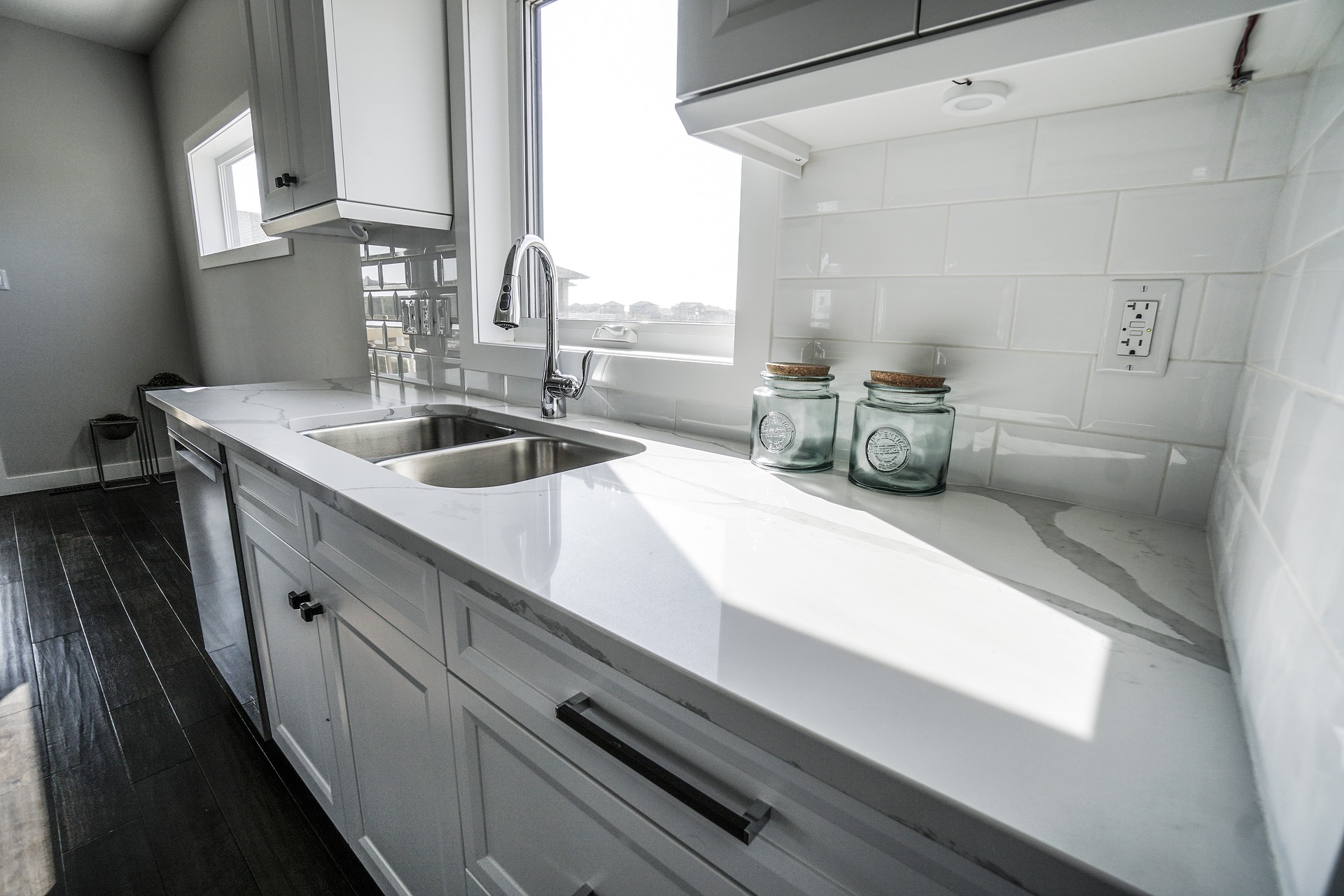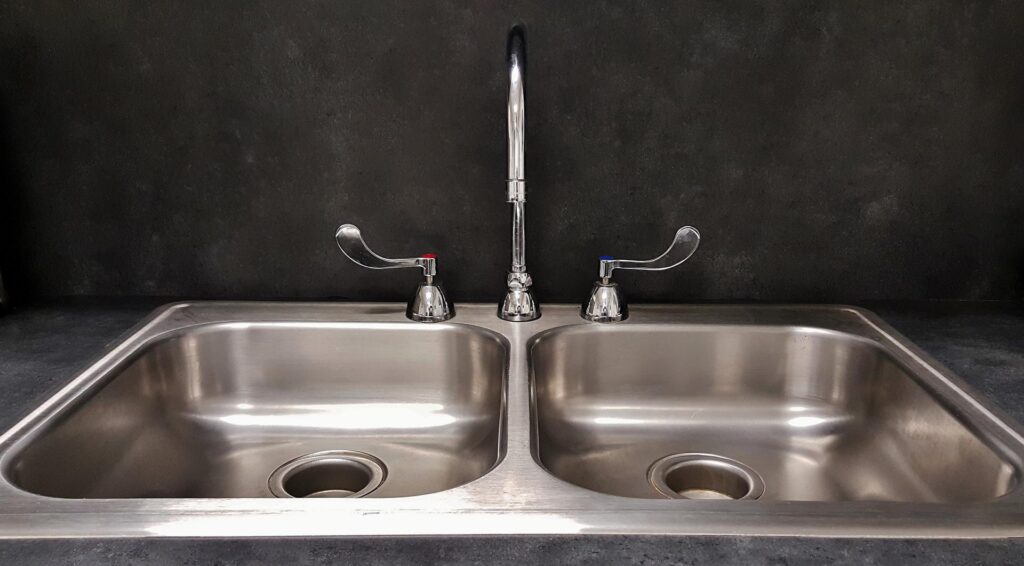Oven cleaners are specifically designed to remove oven stains.
They contain strong, highly toxic, and corrosive chemicals.
Using oven cleaners over countertops can lead to corrosion, fading, and losing color.
What is Oven Cleaner?
Oven cleaner is a cleaning product designed to clean the insides of the oven.
It cleans up the layers of grime, gunk, and any baked-on crud accumulated inside the oven from repeated use.
But the chemicals used in these cleaners are highly toxic and unsafe for direct contact during cleaning.
What are the Ingredients for Oven Cleaner?

The ingredients used in the cleaners are intensely toxic.
There is a long list of chemicals used in these cleaners, but we are discussing the most common here;
Caustic Soda
It is also called Lye or Sodium Hydroxide.
It is frequently used in soaps, shampoos, and other liquids used for unclogging.
Ether
They have a chemical composition similar to alcohol.
They are good at dissolving stuff like oil, grease, waxes, and grime.
Ethylene Glycol
It’s an odorless and colorless chemical and has a sweet taste.
On consumption, it can be highly toxic, leading to kidney failure, brain damage, and much more.
Methylene Chloride
This chemical is dangerous to inhale and should never be touched with bare hands.
It is highly volatile and colorless at room temperature.
It is used in manufacturing photographic films, paint stripping, and removing grease.
What is the Effect of Oven Cleaner on Different Types of Countertops?
The effect of oven cleaner on countertops is highly damaging.
But it varies depending on the material of the countertop itself
Because the oven cleaner chemicals have different reactions when coming in contact with other surfaces.
Here we are looking at reactions to different countertops.
Related Reading: Labor Cost To Install Kitchen Counter Tops – Find Out Here.
a countertop made of Stone
Most stone countertops are made of natural stones like Granite and marble.
They are naturally inert and do not easily discolor on exposure to harsh chemicals.
However, other types of artificial countertops are at a higher risk of getting damaged by an oven.
Because it is made of an engineered stone that is made by putting together specific pigments for color addition.
Countertops made of Tiles
Tiles are an uncommon type of countertop.
But they are relatively hard to clean, especially the grout lines.
Which is the reason many people turn to oven cleaner for cleaning them.
The effect of spraying oven cleaner on the tiles will remove and distort the top finish of the tiles.
After a while will start damaging grout as well.
Stainless Steel Countertops
This type of countertop is quite common in modern and professional kitchens.
But when exposed to chemicals, it will get stained.
Some steel countertops may survive the oven cleaner chemicals, but it’s not worth risking.
Countertops made of Formica
Formica countertops are one of the toughest surfaces to damage.
But even they will see color damage and are vulnerable to the oven cleaner chemicals.
Countertops made of wood
These countertops may be the most vulnerable to chemicals.
When exposed to the chemicals, the wood will show a bubbling reaction and turn into a gummy paste.
That will make the countertop unable to be used again without expensive repairing.
Alternatives to Oven Cleaner on Countertops
Here we are discussing what can be used instead of oven cleaners to clean countertops;
For Stone Countertops
Its cleaning material depends on the type of stone used.
So specific cleaning materials depend on the type of stone.
But dish soap and warm water will work fine for stone countertop cleaning.
For a granite countertop, use the granite sealer regularly. It forms a protective layer by soaking into the stone.
For Tile countertops
Use a solution of water and dishwashing soap for the tiles, heat it, and do the cleaning with it.
For the grout, use a specialized grout cleaning tool, a toothbrush, or a toothpick for a more DIY way.
For stainless steel countertops
Stainless steel countertops are relatively easy to clean as they are impenetrable.
You can use a solution of warm water and dishwashing soap or for deeper stains.
Use hot water and vinegar, leave it on the stain for a few minutes and then clean off with warm soapy water.
For Formica Countertops
An all-purpose kitchen cleaner works well on formica countertops.
A mixture of warm water and dish cleaner also works fine.
For Wooden Countertops
As these countertops are the most sensitive, use only a mild mix of water and soap.
Spray the mixture, leave it for some time, and wipe it off with a paper towel.
You should never submerge the wooden countertops with water.
Prolonged exposure to water can cause mold, moisture, and rot in the wood.
What to do if you’ve Used Oven Cleaner on Kitchen Countertops

While the damage may have been done to the countertops, some measures can be carried out to contain it;
Polishing
For all the countertops that aren’t made of wood
Clean them with a regular cleaning material used specifically for countertops, and then use a polish.
This technique won’t work if the damage is too intense.
But it’s worth a try and possibly would help get some of the shine and color back.
The oven cleaning chemicals may have faded that.
For Wooden Countertops
For a damaged wooden countertop:
First, clean it up with soap water mixture and/or some wood countertop cleaner.
Once the surface is dried up, use the specialized wood oil, and it will possibly help in restoring it to its original condition.
What is the Effect of Oven Cleaner on Kitchen Countertops – FAQs
Here we are addressing some of the most frequently asked questions regarding the effects of oven cleaners on kitchen countertops;
Does oven cleaner stain countertops
Yes, it may stain your countertop, like an oven cleaner on a stainless steel countertop will leave stains on it.
Also, it depends on the composition of the over cleaner and the material of the countertop,
as each material reacts differently to the chemicals in the cleaner.
What to clean countertops with
You might have realized that oven cleaner will do more harm than good to your countertops.
And you have to look for some alternatives now, so here we are discussing some other options now;
Baking Soda
So the first one is the classic home cleaning chemical called baking soda or caustic soda.
It can be used on any countertop regardless of the material. So here it goes;
- Take equal amounts of baking soda and white vinegar in a bowl.
- Mix them until they form a paste.
- Apply it to the countertop
- Leave it for a day or two.
This mixture will soak up and effectively remove stains from the countertop without harsh chemicals.
That is not only damaging to the countertop but also poses harm to the one using it.
Bleaching
The second method also uses a household cleaning detergent, i.e., bleach,
while this method isn’t as harmful as using oven cleaners on countertops.
It may become dangerous if used without caution, as you know that bleach is known for fading colors.
- Use a cotton ball and dip it into mild bleach.
- Rub the spot for a while until the stains are removed.
- Clean as usual when done.
- Stop immediately on noticing any discoloration.
What is the best cleaner for kitchen counters?
There are a few best ones in different categories.
However, the single best one in all categories in terms
- Disinfecting,
- Budget
- Eco-friendly,
is the Clorox Scentiva Multi-Purpose Spray {Source}.
What happens when you use oven cleaner on kitchen countertops
Oven cleaners will most likely corrode your countertops, then clean them,
As the oven cleaner is packed with intense and highly toxic chemicals.
That is made for cleaning the harsh stains and gunk accumulated in the oven from repeated usage.
An oven cleaner will most likely melt away the upper shiny protective layer of the countertop.
Then seep deep into it, which will lead to permanent damage to the countertop.
Oven cleaners are simply the worst type of cleaner you can use to clean anything other than the oven.
Should I clean my oven after every use?
No, ovens don’t need cleaning after every use.
Instead, it would be best if you plan a schedule for oven cleaning depending on the usage and also your frequency of use.
The more you use it, the more often it needs cleaning.
It’s normal to have food spillage, splitting, and grease accumulating in the ovens, leading to stubborn stains.
Which need toxic chemicals for cleaning, but you can prolong the oven cleaning time by wiping the insides of the oven after every use.
It’s wise not to let any grease or gunk build up in the oven to avoid having to clean it so often.
Is oven cleaning dangerous
Yes, oven cleaning can be dangerous and can pose serious health concerns,
If you are unaware of the toxicity of the oven cleaning chemicals.
And also don’t know how to avoid getting in direct contact with them while cleaning.
Which vinegar for cleaning the oven?
Apple Cider Vinegar is the best type of cleaner for oven cleaning.
Besides being excellent for treating some ailments, it’s also a formidable cleaner.
A 1:1 mixture of this vinegar and water can be used to clean any place in your house, even bathrooms.
The inside of an oven is one of the dirtiest places in your home and has all kinds of residues and grease from cooking.
A mixture of apple cider vinegar and water also has anti-bacterial properties.
Which will not only clean stains, grease, or gunk.
But also clean your oven off any bacteria, leaving a prim and clean range for use again.
Also, as this mixture is diluted, it won’t dull or decolorize your oven.
What is the best oven degreaser?
There are many oven cleaners in the market, but if we talk about one that removes grease the best.
It would be Goo Gone Oven and Grill Cleaner. It cleans off any grease within three to five minutes of spraying.
Its citrus base can cut through any grease build-up.
Allow it to sit for more time if the spill or grease is tougher {Source].
Final Thoughts
The bottom line is that you should not use oven cleaners for anything other than cleaning the ovens.
The toxic chemicals in these cleaners can harm your countertops and yourself but may not be reversed in some cases.
So prudence demands you to use other easy and simple tricks like diluted vinegar or bleach for cleaning countertops to avoid any harm.


